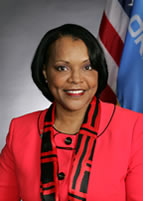In order to provide equal access and equal opportunity to people with diverse abilities, this site has been designed with accessibility in mind. Click here to view
Legislature Approves African-American Plaza For Capitol
 Senator Constance N. Johnson
Senator Constance N. Johnson
Legislation was approved Thursday on the House floor for the creation of an African-American Centennial Plaza to be built south of the State Capitol as part of Oklahoma’s Centennial celebration in 2007.
Senate Bill 1919, co-authored by Sen. Constance N. Johnson (D-Oklahoma City) and Rep. Jabar Shumate (D- Tulsa), calls for the creation of an African-American Centennial Plaza and a committee to oversee the design of the project. It now goes to Gov. Brad Henry for his signature.
Johnson said the purpose of the committee is to recommend the design of the plaza and to provide oversight and advice to the Oklahoma Historical Society in the design, construction, and funding sources of the project.
The plaza will be located in the median of Lincoln Boulevard between 18th Street and the State Capitol Building. Total cost is estimated at $4 million and construction will begin after funding is secured.
“I appreciate the process whereby we reached a nonpartisan consensus on the language of this bill,” Johnson said. "We all learned a lot and grew a lot. That accomplishment alone speaks volumes to the timeliness of this project.”
“I want to thank my fellow legislators for their support. This plaza is something the entire state can be proud of,” Rep. Shumate added.
Johnson said the design committee will consist of seven members including members from the offices of the Senate Pro Tempore, the Speaker of the House of Representatives, the Governor, Lieutenant Governor, Oklahoma Historical Society, Department of Central Services and the Oklahoma Arts Council.
The committee’s duties will include developing criteria for and soliciting public comment and input on the development and design of the plaza. It will also develop and implement criteria for a design competition.
The committee will select three designs as finalists from among the designs submitted through the competition and will present the selected designs to the public for comment and input.
A winning and an alternate design will be chosen and forwarded on to the executive director of the Oklahoma Historical Society.
The committee also will provide oversight and advice to the Oklahoma Historical Society during the design and construction of the plaza.
The director of the Department of Central Services will be responsible for awarding all contracts related to the construction of the plaza. The DCS will be responsible for the maintenance and upkeep of the plaza.
Blake Wade, Executive Director of the Oklahoma Centennial Commission, said he was pleased the Legislature approved SB 1919.
“As we commemorate our state’s first 100 years, we’re pleased that we’ll be able to have the Oklahoma African-American History Plaza on the grounds of our capitol as a lasting memorial and tribute to Oklahoma’s rich African-American history,” Wade said.
Themes for the plaza will include Oklahoma’s African American military history, such as black Civil War soldiers in Indian Territory; the founding and development of historically black towns like Langston, which houses Langston University; Tulsa’s Black Wall Street; and Deep Deuce in Oklahoma City, which was the home of some of the most prominent African-American jazz musicians in the country.
“For the first time in Oklahoma’s history, people will see a magnificent outdoor monument that features the accomplishments of African-Americans toward the growth and development of this great state of ours,” said Bruce Fisher of the Oklahoma Historical Society.
Johnson said SB 1919 passed on the House floor by a vote of 77-13 and unanimously on the Senate floor.
“With the passage of this enabling legislation, we are now empowered to go full speed ahead in the raising the money to make the plaza a reality,” Johnson said. "This bill also represents a victory for the people who believed in this concept from day one. They lobbied and advocated and learned that the power of the people to affect the legislative process is real and do-able. Rep. Shumate and I congratulate them for a job well-done.”
 Oklahoma Senate
Oklahoma Senate

